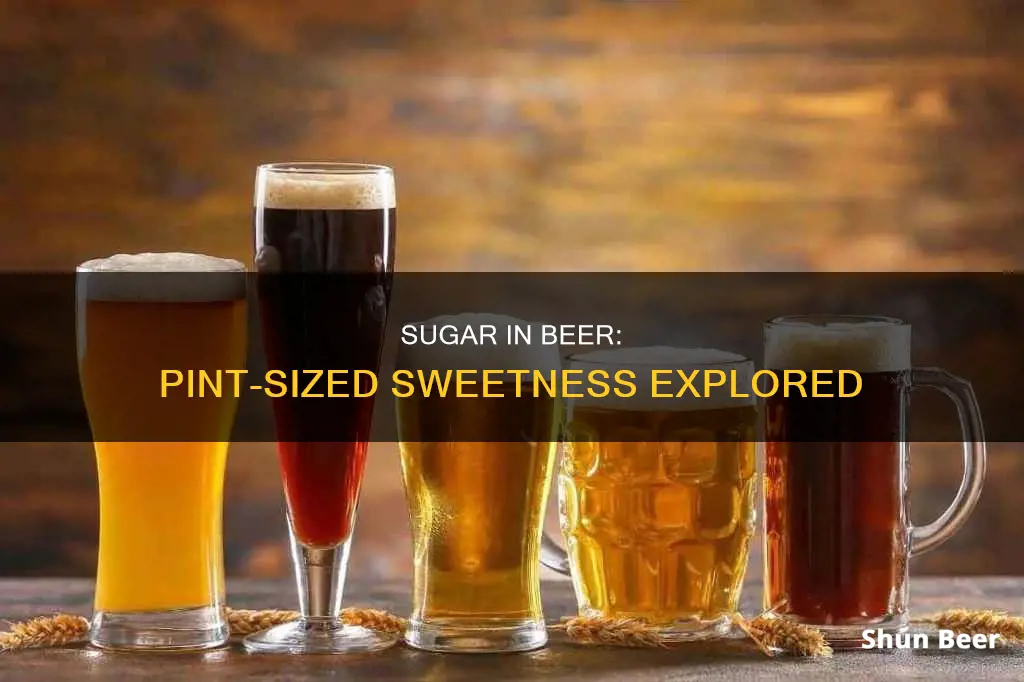
Beer is one of the most popular alcoholic drinks globally, but its sugar content is often a concern for health-conscious drinkers. The sugar content in beer varies depending on the style, ingredients, and brewing process. On average, a pint of beer contains around 1-3 grams of sugar, with lighter beers having lower sugar content and heavier beers, such as stouts and porters, containing slightly more. Beer's sugar content is created during fermentation, where yeast converts sugars from malted grains into alcohol, and some residual sugar may remain in the final product. While beer does contain sugar, it is generally not a significant source of sugar in one's diet unless consumed excessively.
| Characteristics | Values |
|---|---|
| Amount of sugar in a pint of beer | On average, a pint of beer contains around 1-3 grams of sugar. |
| Factors affecting sugar content | Style, ingredients, and brewing process. Lighter styles, such as lagers, tend to have lower sugar content, while heavier styles like stouts and porters may contain more sugar. |
| Added sugars | Beer typically does not contain added sugars. The sugar comes from the natural sugars in the grains used during the brewing process. |
| Carbohydrates | Beer is relatively high in carbohydrates compared to other alcoholic drinks. A pint of beer contains around 10-20 grams of carbohydrates. |
| Taste | The sugar content can contribute to the overall taste profile, with sweeter styles of beer having a higher sugar content and a more prominent sweet taste. |
| Dietary sugar | In the context of a balanced diet, the sugar content in a pint of beer is relatively low and can be enjoyed in moderation without significant concerns. |
| Beer and diabetes | People with diabetes should consult their healthcare provider regarding alcohol consumption as beer can affect blood sugar levels. |
| Low-sugar options | Yes, there are low-sugar or sugar-free beer options available. These are often marketed towards individuals watching their sugar intake or following specific dietary requirements. |
| Calories | Sugar contributes to the calorie content of beer, but it is not the sole factor. Alcohol content and other ingredients also play a role. |
| Weight gain | While beer with higher sugar content may contribute to calorie intake, weight gain is more influenced by overall calorie consumption and lifestyle factors. |
| Blood sugar levels | Beer with higher sugar content can have a minor impact on blood sugar levels, especially for individuals with diabetes. Moderation is key. |
What You'll Learn

A pint of beer contains 1-3 grams of sugar on average
Beer is one of the most popular alcoholic beverages worldwide. It is made from grains, spices, yeast, and water. Barley and wheat are the most commonly used grains, while hops are the principal flavouring spice. During the brewing process, the grains are germinated, roasted, milled, and soaked in hot water to create a sugar-containing liquid called wort. The wort is then boiled, cooled, and filtered, and yeast is added to start the fermentation process, where the sugars are converted into alcohol and carbon dioxide.
The amount of sugar in beer varies depending on the style, ingredients, and brewing process. On average, a pint of beer contains approximately 1-3 grams of sugar. Lighter beers, such as lagers, tend to have lower sugar content, while heavier beers like stouts and porters may contain slightly more sugar. The sugar content in beer comes from the natural sugars found in the grains used during the brewing process, and no additional sugars are typically added.
Beer is relatively high in carbohydrates compared to other alcoholic drinks. A pint of beer contains around 10-20 grams of carbohydrates. The sugar content in beer contributes to its overall caloric value and taste profile. Sweeter beers with a higher sugar content will have a more prominent sweet taste.
It is important to note that while beer contains sugar, it is not typically a significant source of sugar in one's diet unless consumed excessively. There are also low-sugar or sugar-free beer options available for those watching their sugar intake. Moderate beer consumption has been linked to certain health benefits, such as a reduced risk of heart disease and improved bone health. However, excessive beer consumption can contribute to weight gain and increase the risk of liver damage and certain diseases. Therefore, it is important to consume alcoholic beverages in moderation and be mindful of the overall caloric intake.
Non-Alcoholic Beer: Sugar-Free or Not?
You may want to see also

Beer's sugar content depends on the style and brewing process
The sugar content in beer depends on several factors, including the style of beer and the brewing process used.
Firstly, let's break down the brewing process, as this is crucial to understanding how sugar is present in beer. The process begins with yeast being added to the wort (the liquid extracted from malted barley during brewing). This initiates the fermentation process, where the yeast converts fermentable sugars into alcohol and carbon dioxide. This process determines the final alcohol content of the beer.
Barley is key to this process, as it provides the basic sugar levels for fermentation. The malting process involves soaking barley grains in water, germinating them, and then drying them. This breaks down complex carbohydrates into simple sugars like glucose, which are more easily fermented by yeast.
Now, let's discuss how the style of beer can impact its sugar content. Lighter styles of beer, such as lagers, tend to have lower sugar content. Heavier styles, like stouts, porters, and dessert beers, may contain slightly more sugar. Sweeter styles, such as fruit beers and barley wines, will also have higher sugar levels.
The type of yeast used also plays a role. Ale beers, made with Saccharomyces cerevisiae strains, tend to have a higher alcohol content and lower sugar content than lager beers, which use Saccharomyces pastorianus strains.
Additionally, the presence of adjuncts like corn or rice in the ingredients can impact the sugar levels. Light beers often use these adjuncts, resulting in lower residual sugar levels after fermentation.
Non-alcoholic beers typically have higher sugar content as they undergo minimal fermentation. Since fermentation is what reduces sugar levels by converting them to alcohol, non-alcoholic beers can contain upwards of 10-15 grams of sugar per 12-ounce serving.
In summary, the sugar content in beer depends on the style of beer, the ingredients used, and the specific brewing process. While beer generally contains a small amount of sugar, the sugar levels can vary, and certain styles and ingredients may result in higher sugar content.
Beer and Blood Sugar: What's the Connection?
You may want to see also

Beer contains natural sugars from grains
Beer is made from four basic ingredients: water, grains (often barley or wheat), hops, and yeast. The sugar in beer comes from the natural sugars found in the grains used during the brewing process.
The first step in the brewing process is malting, where grains are soaked, germinated, and dried to convert stored starches into fermentable sugars. The malted grains are then soaked in hot water to create a sugar-containing liquid called wort. During the boiling step, hops and other spices are added for flavouring.
The fermentation process is where the sugars from the malted grains are converted into alcohol and carbon dioxide by the yeast. The amount of sugar left in the beer depends on the type of yeast and how efficiently it ferments the sugars. Some residual sugar may remain in the final product, contributing to the overall taste profile.
Beer contains two main types of sugars: simple sugars (like glucose and fructose) and more complex sugars (e.g., oligosaccharides). The simple sugars are fermented by the yeast, while the complex sugars remain in the beer, adding sweetness.
The amount of sugar in beer can vary depending on the style and brewing process. On average, a pint of beer contains approximately 1-3 grams of sugar, with lighter styles of beer, such as lagers, tending to have lower sugar content. Heavier styles, like stouts and porters, may contain slightly more sugar.
Beers' Surprising Impact: Lowering Blood Sugar, How Many?
You may want to see also

Beer is relatively high in carbohydrates
Beer is one of the most widely consumed alcoholic beverages worldwide. While it is not a significant source of sugar in one's diet, it is relatively high in carbohydrates compared to other alcoholic drinks. On average, a pint of beer contains around 10-20 grams of carbohydrates. The sugar content in beer can vary depending on the style, ingredients, and brewing process.
The fermentation process plays a crucial role in determining the sugar content of beer. During fermentation, yeast converts sugars in the ingredients (such as malted barley) into alcohol and carbon dioxide. However, some residual sugar may remain in the final product, contributing to its flavour and texture.
Beer's main type of sugar is maltose, made from two glucose molecules. Other sugars found in beer include simple sugars like glucose and fructose, and more complex sugars like oligosaccharides. The amount of residual sugar in beer depends on the type of yeast and the efficiency of the fermentation process.
Lighter styles of beer, such as lagers, tend to have lower sugar content, while heavier styles like stouts and porters may contain slightly more sugar. Beer gravity, a measure of the concentration of sugars in the wort, also impacts the final sugar content. High-gravity beers often have more sugar, while low-gravity beers have less.
The sugar content in beer contributes to its overall caloric value. While beer may not have a high sugar content, it is an alcoholic drink, and alcohol can impair sugar metabolism, leading to potential hypoglycaemia. Therefore, it is generally recommended to consume beer with a carb-containing meal.
For those watching their sugar intake, there are low-sugar or sugar-free beer options available. These include non-alcoholic, low-carb, and light beers. However, it is important to note that light beers may lack the flavour and richness of regular beers.
In conclusion, while beer may not be a significant source of sugar in a balanced diet, it is relatively high in carbohydrates. The sugar content can vary depending on the specific beer and its brewing process. Moderation and balance are key when enjoying beer or any other alcoholic beverage.
Priming Sugar Secrets: Carbonation in Beer Explained
You may want to see also

Beer's sugar content impacts its taste
Beers Sugar Content Impacts Its Taste
Beer is a widely consumed alcoholic beverage, enjoyed for its refreshing and diverse flavours. While it is known that beer contains sugar, the amount can vary depending on the style, ingredients, and brewing process. On average, a pint of beer contains around 1-3 grams of sugar, with lighter beers having lower sugar content than heavier ones. The sugar in beer comes from the natural sugars found in the grains used during the brewing process, and some residual sugar can remain in the final product, impacting its taste.
The Role of Sugar in Beer
Sugar is crucial to the beer-making process. During fermentation, yeast consumes the sugar in the ingredients, converting it into alcohol and carbon dioxide. The type of yeast and the fermentation process determine how much sugar remains in the final product. Some beers may also add sugars to enhance the taste or increase the alcohol content.
How Sugar Affects Beer Taste
The sugar content in beer contributes to its overall taste profile. Sweeter styles of beer, such as fruit beers or barley wines, tend to have higher sugar levels, resulting in a more prominent sweet taste. Heavier, malty beers like stouts and porters may also contain slightly more sugar, giving them a richer, more robust flavour.
Beer Gravity and Sugar Content
Beer gravity measures the concentration of sugars in the wort, which is the liquid extracted from malted barley during brewing. High-gravity beers have more sugar, resulting in higher sugar levels post-fermentation, while low-gravity beers have less sugar and lower alcohol content.
Light Beers and Sugar Content
Light beers generally have less sugar than traditional beers due to reduced carbohydrates. While they may not have a high sugar content, they may also lack the flavour and richness of regular beer. Non-alcoholic beers, on the other hand, tend to have slightly higher sugar levels than their alcoholic counterparts since the sugar is not converted into alcohol.
Health Considerations
While beer may not have a high sugar content, it is important to consume it in moderation as part of a balanced diet. Beer is relatively high in carbohydrates compared to other alcoholic drinks, and excessive consumption can contribute to weight gain and impact blood sugar levels, especially for individuals with diabetes.
Low-Sugar Beer Options
For those watching their sugar intake, there are low-sugar or sugar-free beer options available. These include non-alcoholic, low-carb, and light beers, which can be enjoyed responsibly without compromising taste.
Beer and Blood Sugar: How Three Beers Affect You
You may want to see also
Frequently asked questions
On average, a pint of beer contains around 1-3 grams of sugar. However, the amount can vary depending on the style, ingredients, and brewing process. Lighter beers tend to have lower sugar content, while heavier beers like stouts and porters may have slightly more sugar.
Yes, the sugar content in beer can contribute to its overall taste profile. Sweeter styles of beer, such as fruit beers, tend to have a higher sugar content, resulting in a more prominent sweet taste.
In the context of a balanced diet, the sugar content in a pint of beer is relatively low and can be enjoyed in moderation without significant concern. However, excessive beer consumption can contribute to weight gain due to its caloric content.
Yes, there are low-sugar and sugar-free beer options available in the market. These beers are often targeted towards individuals who are watching their sugar intake or have specific dietary requirements.







